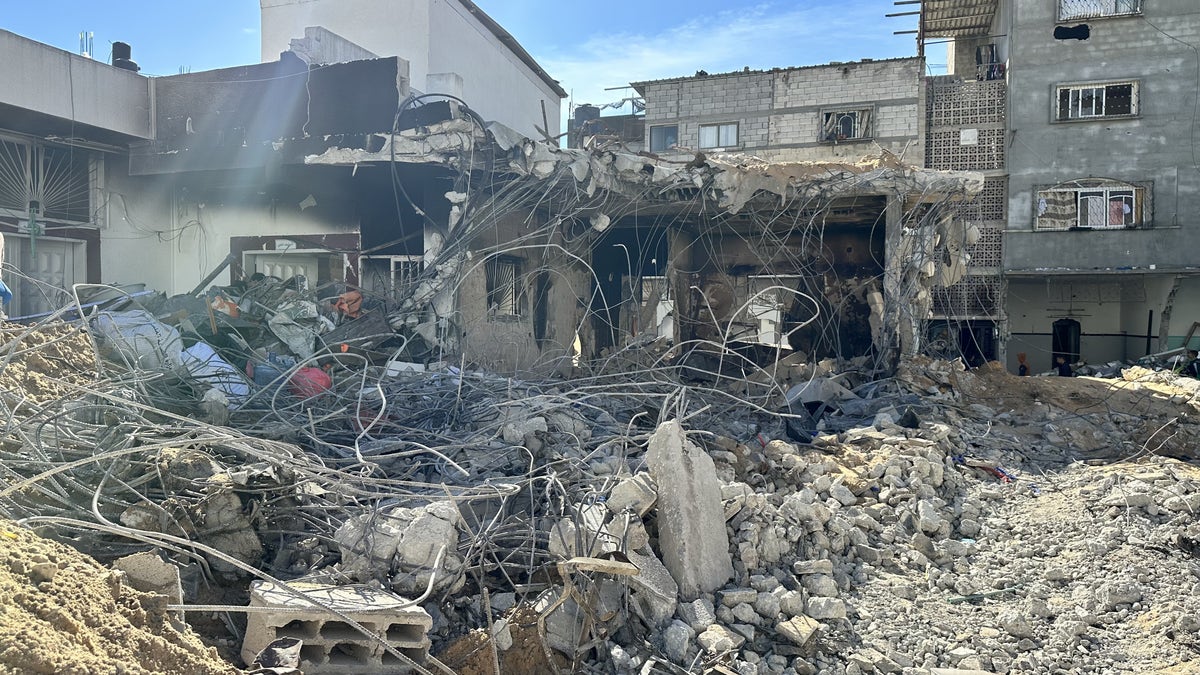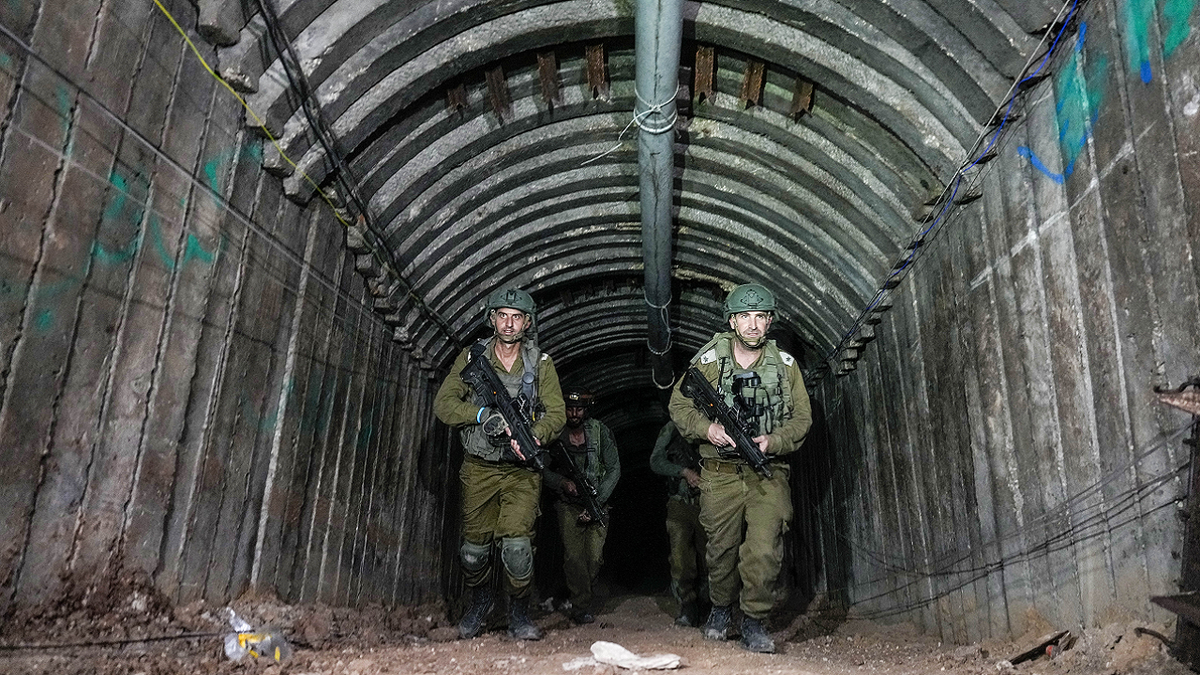Israel 'close to completing' high-intensity fighting in northern Gaza
Fox News correspondent Trey Yingst reports the latest on the war from Tel Aviv.
One of those days I remember best, because it was almost my last, was near the Iranian border during the height of the Iraq War in 2005. I was merely a "supporting effort," sent to secure the far side of a small farmhouse while the "main effort" stormed inside. But a split second after I was the first to dash past a window, I felt the sharp blast of a close rifle shot, and the soldier inches behind me was shot in the head. Obviously, that shot was intended for me.
We were going after a known terrorist, supposedly holed up in this remote hut, and we had a lot of options for what to do next. The most expeditious was to toss a grenade into that open window. Or we could have pulled back and called in an airstrike. At different times leading Marines in the war, I had done both.
But what the leader of our team, a seasoned U.S. Army Special Forces master sergeant, chose to do next made me truly proud to be an American. Without hesitation, he charged smoothly and confidently through the main door of the farmhouse, rifle in front of his face just as we were all trained, turned right into the room where that shot had rung out, and with two perfect shots, took down the man who had killed our friend.
LATIN PATRIARCH SAYS PHOTOS SHOW BOMBED GAZA CONVENT AS WHITE HOUSE RAISES 'CONCERNS' WITH IDF
The first thing I saw as I entered the room at his back was a woman and child cowering in a corner. A grenade, an airstrike — both of these would have presented far less danger to us — but they would have instantly killed the entire family.

A view of destroyed roads and Kamal Adwan Hospital after Israeli attacks on Beit Lahia, Gaza on December 16, 2023. (Mahmoud Sabbah/Anadolu via Getty Images)
We were a small detachment of Army Special Forces soldiers with their Iraqi Special Forces counterparts and a couple of Marines like me. Like the Israeli troops assaulting Gaza today, we had a lot of choices on that mission.
Given the intelligence, the team leader might have made the argument that an airstrike was justified, and we might have never left the base. He could have sent a team of snipers to observe and wait for a shot.
But we know that intelligence in war is often wrong, and every one of us had seen innocents killed in the crossfire, something we tried assiduously to avoid. By that time in the war, we understood that we were in a counterinsurgency fight where, with every operation, you had to be careful not to generate more terrorists than you killed. The best way to recruit terrorists to the cause is to kill innocent civilians, which, of course, is why Hamas deliberately puts civilians in the crossfire, just like the terrorist in this farmhouse in Iraq.
Recently, a quote from an IDF infantryman has been floating around conservative media blaming Americans, specifically President Joe Biden, for pressuring the Israelis to be more targeted in their air campaign. "How can it be that an area isn’t cleared from the air before allowing our soldiers to enter?" the soldier protests. Israel did that earlier in the war, he says, but now "our fire power is being restrained because our leaders may have started prioritizing the enemy’s lives over the lives of our soldiers."
This junior Israeli officer obviously doesn’t understand the basic principles of a counterinsurgency campaign. There’s nothing more fundamental, morally and militarily, than differentiating between terrorists — the enemy — and kids. Israel has killed thousands of children in Gaza already.
Biden has been castigated for using the term "indiscriminate" to characterize Israel’s bombing campaign. While the IDF has a long history of going to exceptional lengths to avert civilian casualties, a record more impressive, I would argue, than that of any military in the world, it’s hard to make the case they are doing so today.
IDF troops are so quick to shoot that they killed three Israeli hostages last week, and recent reports revealed that only slightly more than half their air-to-ground munitions are guided or "smart" bombs that they are using in urban areas to limit collateral damage, something the U.S. has done for decades.
I’ve always argued that it is essential Israel succeeds in its core mission, to eliminate Hamas. At the end of the day, getting rid of Hamas is critical not just for Israel’s security but for Palestinian human rights; nobody wants to live under a government that uses civilians as human shields.

Israeli soldiers are seen on Friday, Dec. 15, in a tunnel that the military says Hamas terrorists used to attack the Erez crossing in the northern Gaza Strip. (AP/Ariel Schalit)
But Israel will fail to achieve this goal if it continues ignoring basic principles of counterinsurgency warfare and keeps killing so many civilians, creating more terrorists than they eliminate. The idea that an area should be "cleared from the air before allowing soldiers to enter," as the IDF soldier said — in other words, bombed into oblivion — is morally bankrupt and militarily stupid.
The polling data supports this: Just days before October 7, over 6 in 10 Gazans said they had little trust in Hamas, and just a quarter of Gazans said their government was responsive to their needs.
Now, polling shows sharply climbing support for Hamas in both Gaza and the West Bank. Israel is literally turning the tide against themselves.
I understand this young officer’s frustration — I felt it myself so many times in Iraq that I ultimately ran for Congress a few years after I got out. Too often, I saw people in Washington making political decisions about the war that cost young American lives on the ground.
Over four tours in Iraq, I heard troops blaming Democrats for not supporting the war vigorously enough, Republicans for starting it in the first place, and President George W. Bush, of course, for his decisions as commander in chief. But that doesn’t mean every complaining soldier or Marine was right.
Pressuring Israel to learn the hard lessons of a counterinsurgency campaign that took us years to learn ourselves in Iraq and Afghanistan is the right thing to do, not just for the innocent Palestinians of Gaza but for the ultimate success of the Israeli Army.
And, painfully, being adept counterinsurgents does often entail more risk. Under General David Petraeus’ pivotal leadership in Iraq, after he and General James Mattis literally wrote the manual on counterinsurgency warfare, we moved off major bases to live and work among the populace. And, initially, U.S. casualties went up. But it also turned the tide of the war.
Likewise, for Israel, recognizing that killing innocents is exactly what Hamas wants and therefore attacking more surgically, relying less on air power, and using more infantry to clear, may cost more lives of Israeli troops in the short run. But it’s the way to win, and ultimately bring peace so that hundreds more Israeli troops don’t die in the years to come, not to mention Israeli civilians in another attack like October 7th.
I’ve always argued that it is essential Israel succeeds in its core mission, to eliminate Hamas. At the end of the day, getting rid of Hamas is critical not just for Israel’s security but for Palestinian human rights; nobody wants to live under a government that uses civilians as human shields.
CLICK HERE FOR MORE FOX NEWS OPINION
It is also the sacred obligation of those of us who wear the uniform to risk our lives so that innocent lives may be spared. Innocents everywhere.
Back in that farmhouse on the Iranian border, the next thing our team leader did after shooting the terrorist … was call up the medic — to try to save his life. Because that’s what Americans do. We are the opposite of terrorists — we fight to save lives, not to end them recklessly. What if the intelligence was wrong and that man wasn’t even a terrorist after all, but just a farmer protecting his family?
That day on the Iranian border was one of my toughest days of the war. I’ll never forget the face of the soldier behind me as he lay obviously dead, or the sorrow of his teammates who knew him best. I’ve thought often of his luck versus mine, and everything I’ve been able to do with my life since.
CLICK HERE TO GET THE FOX NEWS APP
That was a hard day, but it was also one of the days I’ve been most proud to be an American.
Israel would benefit from that example, and we should all want Israel to succeed.




